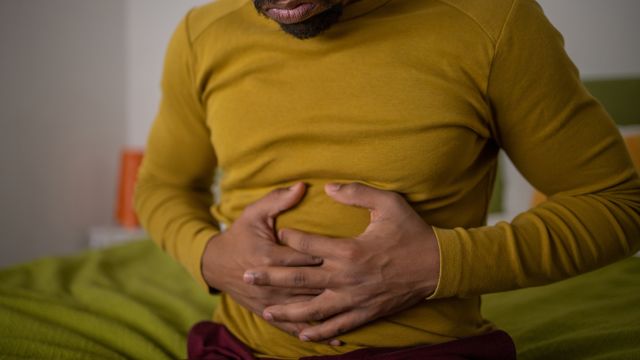Inflammatory bowel disease (IBD) comprises two major disorders, Crohn’s disease and ulcerative colitis (UC). These conditions are characterized by chronic inflammation of the gastrointestinal (GI) tract. There’s no cure for IBD, but those living with the condition can alleviate symptoms by taking certain medications, making simple lifestyle changes, keeping stress levels under control, and, when necessary, undergoing surgery.
Here are some common questions and answers about IBD, including how the condition can affect one’s life, and how it can be treated.
What is IBD?
IBD is a group of conditions involving inflammation in the bowels.
What are the symptoms of IBD?
Symptoms vary from person to person, but diarrhea, abdominal pain, weight loss, fatigue, and blood in the stool are a few common symptoms of IBD.
Who gets IBD?
IBD can be diagnosed at any age, but it is often found in people in their late teens and 20s. While anyone can have the condition, it’s more common among certain groups of people:
- Those who have a family member with IBD
- Jewish people of European (Ashkenazi) descent
- White people
- People who live in cities
- People who live in developed countries
Smoking also seems to affect a person's risk of getting IBD. People who smoke are more likely to develop Crohn's disease, but less likely to develop ulcerative colitis.
How does IBD difer from irritable bowel syndrome (IBS)?
Irritable bowel syndrome (IBS) is characterized by stomach pain and a change of bowel habits without a known cause. IBS is not caused by inflammation.
IBD is characterized by stomach pain, rectal bleeding, and unintentional weight loss, along with other medical problems. These may include arthritis, eye disorders, and kidney stones. IBD involves inflammation of the stomach and colon.
How is IBD diagnosed?
If you think you have IBD, talk to your healthcare provider (HCP). They will use your health history, a physical exam, and certain tests to figure out if you have IBD and, if so, which type.
What is Crohn’s disease?
Crohn’s disease is a chronic autoimmune disease in which the immune system attacks the body’s own cells. Although it can occur in any part of the GI tract from the mouth to the anus, the condition usually occurs in the ileum. This is the part of the GI tract where the small and large intestines meet.
The inflammation involved in Crohn’s disease may affect multiple layers of the walls of the GI tract. Common symptoms of Crohn’s include diarrhea, abdominal pain, urgency to empty bowels, fever, fatigue, and weight loss.
What is ulcerative colitis?
Ulcerative colitis (UC) is limited to the colon and rectum and affects only the innermost layer of the lining of the colon. Symptoms vary depending on the intensity of inflammation and the amount of the colon involved. Patients with mild to moderate inflammation may experience abdominal cramps, diarrhea, rectal bleeding, and urgency to empty bowels. Symptoms of severe inflammation can include fever, weight loss, dehydration, severe abdominal pain, and loss of appetite.
What treatments are available for IBD?
IBD is a chronic condition. There's currently no cure, so medications and monitoring are needed in the long term. Severe cases may require surgery to remove damaged sections of the GI tract. Staying in close consultation with your HCP to make sure you remain in good overall health is an important part of managing IBD.
What role can diet play in IBD?
While following a certain eating plan cannot prevent or cure IBD, making changes to your diet may help reduce symptoms. Depending on which condition (Crohn’s or UC) you have, which part of the intestine is affected, and whether the disease is active or in remission, your HCP may recommend dietary changes such as:
- Avoiding carbonated drinks
- Avoiding certain high-fiber foods, such as popcorn, vegetable skins, and nuts
- Drinking more liquids
- Eating frequent, small meals
Your HCP may also ask you to keep a food diary to help you identify troublesome foods.
Depending on your symptoms and any medications you are taking, your HCP may also recommend you follow a specific type of diet. These may include eating plans that are generally:
- Low in fat
- Low in fiber
- Low in salt
- High in calories
- Lactose-free
If you do not absorb enough nutrients from the foods you eat, your HCP may advise you to take nutritional supplements and vitamins. Always check with your HCP before making any changes to your diet.
What role does stress play in IBD?
Although stress does not cause IBD, it may worsen symptoms. Your HCP may recommend that you try stress-reduction techniques, such as:
- Relaxation and breathing exercises
- Cognitive behavioral therapy (CBT)
- Meditation
- Biofeedback
- Building a support network through family, friends, loved ones, and groups
Regular exercise may be particularly helpful for people with IBD, as it can help reduce stress, among other benefits.







